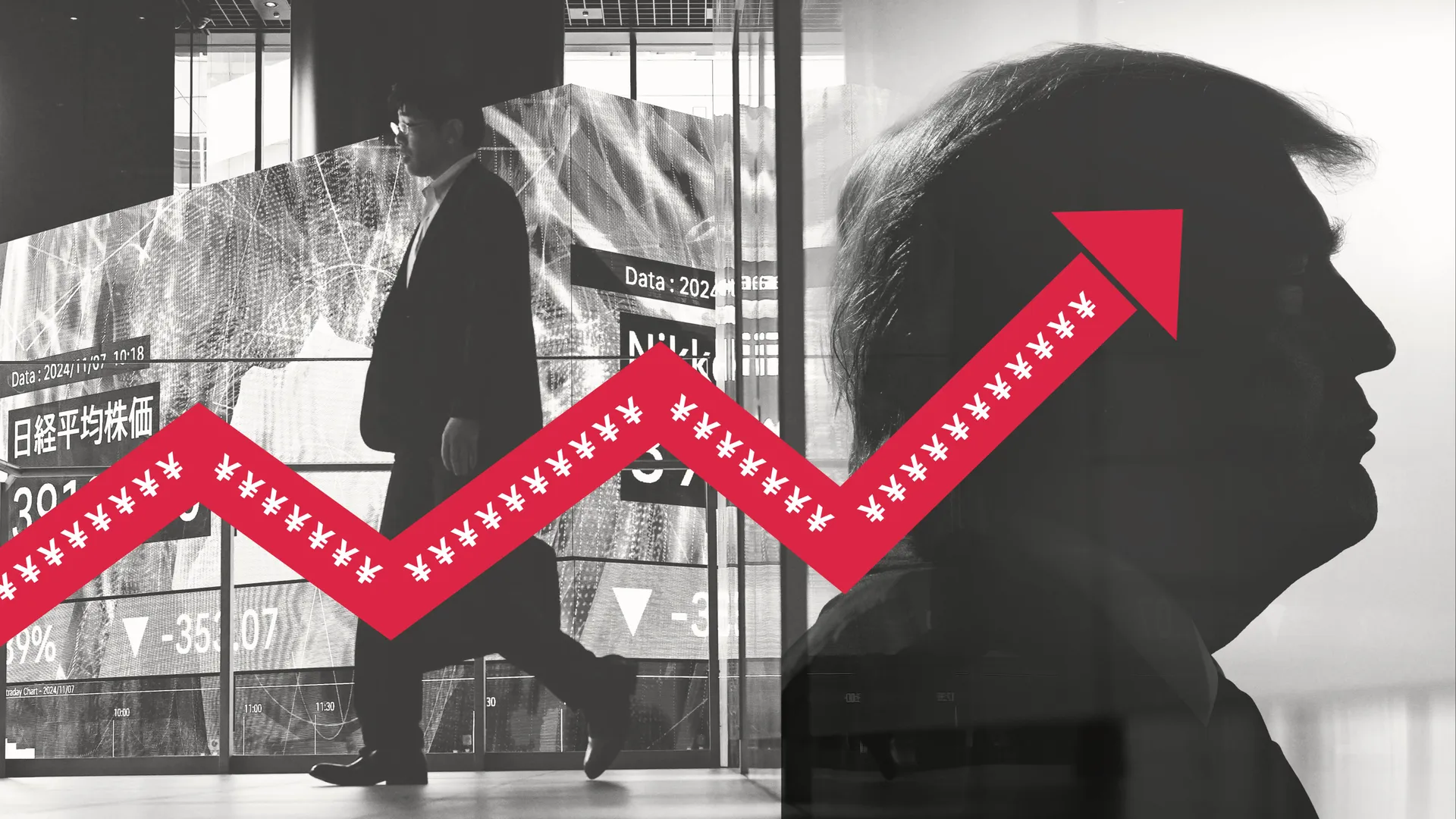尊敬的用戶您好,這是來自FT中文網的溫馨提示:如您對更多FT中文網的內容感興趣,請在蘋果應用商店或谷歌應用市場搜尋「FT中文網」,下載FT中文網的官方應用。


Within a few hours of Donald Trump securing his victory in the US, Japanese media was using the term matatora — the third Trump-related entry in Japan’s dictionary of escalating disquiet at his possible return.
唐納•川普(Donald Trump)在美國取得勝利後幾小時內,日本媒體就開始使用「matatora」一詞,這是日本對於川普可能再次當選而日益加劇的不安所相關的詞典中,與之有關的第三個詞條。
The first word in the sequence, moshitora (“what if Trump”), was current in the latter months of 2023 and set a tone of background nervousness in government, corporate and market circles. The second, hobotora (“most likely Trump”), has been in widespread use this year, demanding more serious fretting around geopolitics, inflation and trade risk. Matatora (“Trump is back”) grants a general licence to gasp.
這個序列中的第一個詞moshitora,「如果川普獲勝會怎麼樣」,是2023年最後幾個月出現的,爲政府、企業和市場界的緊張情緒定下了基調。第二個詞「hobotora」,「很可能是川普」,在今年被廣泛使用,要求人們加大對地緣政治、通貨膨脹和貿易風險的擔憂。Matatora,「川普回來了」,則爲人們發放了倒吸一口氣許可證。
For some, though, the word has unleashed a bullish snort and an argument that — absent embroilment in regional conflict or some other unforeseen calamity — Japan may be better placed than almost any other developed market outside the US to flourish over the next few years.
不過,對於一些人來說,這個詞會讓他們發出滿意的聲音,他們認爲,如果沒有捲入地區衝突或其他不可預見的災難,日本可能比美國以外的幾乎任何其他發達市場都更有條件在未來幾年蓬勃發展。
Tokyo stocks, declares Neil Newman, a strategist who has been covering Japan since the 1980s, have rarely been so primed for ignition. If anything, he says, the political paralysis to emerge from Japan’s messy general election last month, and the implied guarantee of no bad policymaking, should only make the market more attractive to big global funds.
自20世紀80年代起就開始研究日本市場的策略師尼爾•紐曼(Neil Newman)認爲,東京股市從未像現在這樣蓄勢待發。他說,如果說上個月日本混亂的大選造成了政治癱瘓,以及隱含著不會出現糟糕決策的保證,那麼這隻會讓該市場對全球大型基金更具吸引力。
It is a beguiling argument, given an extra sparkle by the various volatile knee-jerk market moves in Tokyo that accompanied Wednesday’s news: gains for exporters (on assumptions of an even weaker yen), defence industry stocks (Trump will demand allies spend more on their militaries), banks (inflation will rise and so will interest rates) and companies that stand to benefit from the (probably accelerated while Trump is in power) reshoring of Japan’s semiconductor industry.
這是一個引人入勝的論點,而伴隨著週三的新聞,東京市場所出現的各種不穩定的膝跳式走勢,爲這一論點增添了額外的光彩。這包括出口商上漲——假設日元將進一步走弱;國防工業股上漲——川普將要求盟國增加軍費開支;銀行上漲——通膨率將上升,利率也將隨之上升;以及將受益於日本半導體產業迴流的公司——川普執政期間可能會加速。
Nicholas Smith, a strategist at CLSA, also sees the prospect of a six-month boost for Japan as animal spirits lift the financial sector. Global capital spending, frozen in the run-up to the US election, should now thaw quickly, favouring Japan.
里昂證券(CLSA)策略師尼古拉斯•史密斯(Nicholas Smith)也認爲,隨著動物精神提振金融業,日本有望在六個月內獲得提振。在美國大選前夕凍結的全球資本支出現在應該迅速解凍,有利於日本。
The longer-term case for Japanese equities under Trump, though, depends on two main lines of reasoning. The first is that Shanghai and Hong Kong’s loss will be Tokyo’s gain. US-China relations under the Biden administration have not been good, and there is reason to expect them to worsen under Trump. US pension funds have already come under pressure to stop or withdraw investment, while China-based dealmaking led by US private equity has all but fallen silent. Some US pension money may have returned to Hong Kong and China in recent months, but that could quickly reverse under Trump. Critically, the flows may well divert to Japan by default as the only developed market in Asia with the breadth and depth to absorb them.
不過,川普執政時期日本股市的長期走勢取決於兩個主要推理。首先,上海和香港的損失將是東京的收益。拜登政府時期的中美關係並不好,有理由預計川普執政時期會進一步惡化。美國養老基金已經面臨停止或撤出投資的壓力,而以美國私募股權基金爲首的中國交易則幾乎陷入沉寂。最近幾個月,一些美國養老金資金可能已經返回香港和中國,但在川普執政期間,這種情況可能會迅速逆轉。至關重要的是,這些資金很可能默認流向日本,因爲日本是亞洲唯一一個在廣度和深度上都能吸收這些資金的發達市場。
A second argument is that Japan’s recent descent into political stasis — the ruling Liberal Democratic party and its leader, Shigeru Ishiba, have yet to pull together a working government — is not, for the stock market, a big problem. Ishiba and his party are too weak to disturb the economy’s momentum, or unravel the progress on corporate governance reform and restructuring that appeals so strongly to foreign investors.
第二個論點是,日本最近陷入政治僵局,執政的自民黨及其領導人石破茂尚未組建一個有效的政府,對股市來說這並不是一個大問題。石破茂和他的政黨過於軟弱,無法擾亂經濟的發展勢頭,也無法破壞公司治理改革和重組所取得的進展,而這些進展對外國投資者有著強烈的吸引力。
There are clearly powerful counter-cases to all this, not least the chance that the Trump administration is associated with such elevated levels of geopolitical uncertainty that investors retreat to the sort of trading patterns that flee risk and tend to reduce exposure to Japan.
顯然,所有這一切都存在強有力的反證,尤其是川普政府有可能導致地緣政治不確定性升高,以至於投資者退縮到逃避風險並傾向於減少對日本敞口的交易模式。
And though Japan may indeed be geared to global growth, a significant chunk of that is exposure to China. Even if Japanese companies can navigate their way through higher tariffs and intensified “pick-a-side” rhetoric from Washington, China itself could be far less rewarding than in the past.
儘管日本可能確實面向全球成長,但其中很大一部分是對中國的敞口。即使日本公司能夠應對更高的關稅和華盛頓加劇的「選邊」言論,中國本身的回報也可能遠不如過去。
On the political front, the risks around Ishiba’s dismal gamble on a general election could prove much greater than Newman and other bulls suppose. The price paid for the prime minister’s weakness — an inability to communicate Japan’s importance to Trump, or present himself as likely to be around long enough to be worth Trump caring about — will be high.
在政治方面,石破茂在大選上的慘淡賭博所帶來的風險可能比紐曼和其他看漲者想像的要大得多。這位首相的弱點所付出的代價將是巨大的,其弱點是:無法向川普傳達日本的重要性,或無法表現出自己有可能長期存在,值得川普關心。
Since early 2024, when the Nikkei 225 Average finally surpassed the record set in 1989, the brokers’ mantra has been that Japan is Back. A succession of big US and European long-only funds have come to Tokyo to check for themselves that the sales pitch holds true. A growing number appear to have returned convinced but without the sort of comfort levels needed for a really big reallocation to Japan. They had in any case been holding fire until after the US election.
自2024年初日經225指數終於超過1989年創下的紀錄以來,券商的口頭禪一直是「日本回來了」。美國和歐洲的大型多頭基金接連來到東京,親自驗證這一宣傳是否屬實。越來越多的基金似乎深信不疑地回來了,但卻沒有達到真正大規模重新配置到日本所需的舒適水準。它們在美國大選之前一直堅定地按兵不動。
Trump is Back may ensure that Japan stays Back. It may also set Japan way, way back.
川普的迴歸可能會確保日本的迴歸,但也可能讓日本倒退。